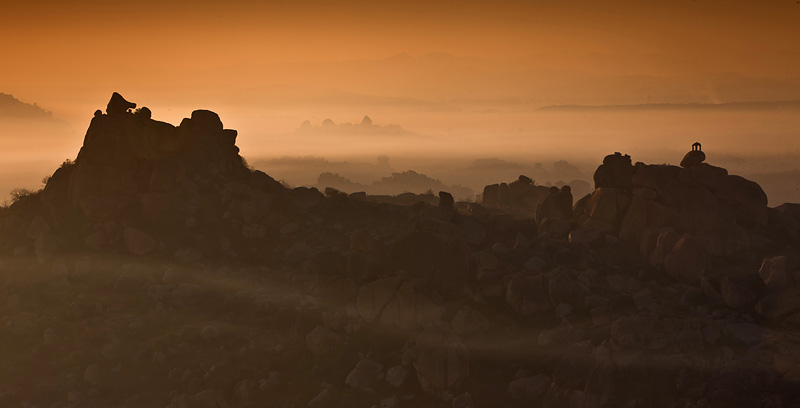The Rough Guide to South India calls the sunrise at Hampi as the “arguably one of the most beautiful sunrises in the world”. It is impossible to disagree. The orange ball raising through the boulder-laden hills of Hampi, with Tungabhadra River weaving through its valleys is a sight that keeps taking me back to Hampi again and again.
Here is a photograph of the sunrise taken by Bhaskar HS, who travelled with Darter to Hampi in our last photography tour. Our next photography tour to Hampi is scheduled on Jan 26 to 28.
Photographing the joy of Hampi’s sunrise is relatively easy, but perfecting it is a challenge. The gentle fog that shrouds the atmosphere in winters mellows the sun down and makes it easy to point into the sun and take pictures. The wavy ridges of the silhouetted hills makes a perfect foreground at the bottom. However, there is a very short window, during which it is possible to take good images before sun becomes a bright glowing ball of fire. It is the time a few minutes after the full sunrise, when the brightness and colours in the sky are just perfect for a click.
A GND Filter can help improve these sunrise images remarkably. A GND Filter blocks light partially at the top and tapers down to fully transparent at the bottom. Mounting this filter in front of the lens helps in levelling the higher brightness of the sky with lesser brightness on the ground. This allows details of the sky as well as ground to be captured well in the photograph.
The GND filter allows the photographer to linger a little longer, even before sunrise as well as after the sun becomes a bit brighter. It also opens up many more framing possibilities than what one would have to settle without a filter.
Camera Data: Canon EOS 5D Mark II and 17-40 lens, f/14, 1/5sec at ISO 200 with two 2-stop GND filters mounted on the lens.


One Comment